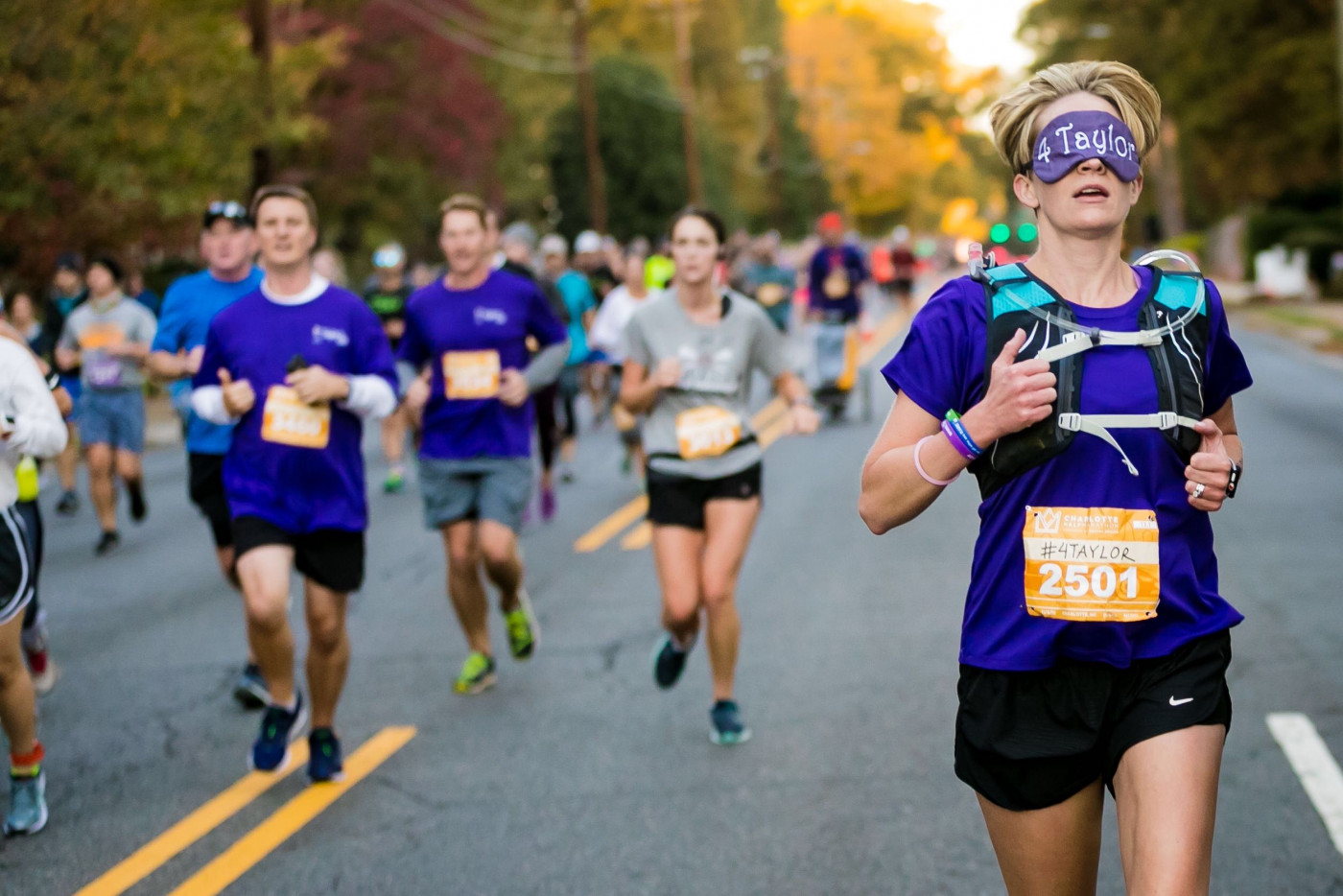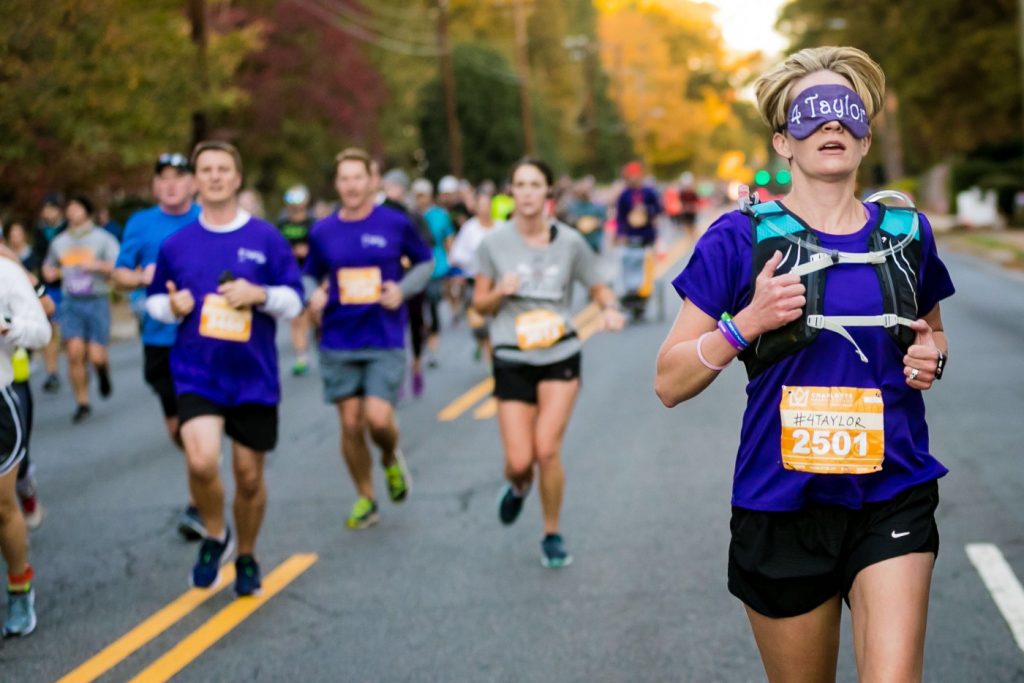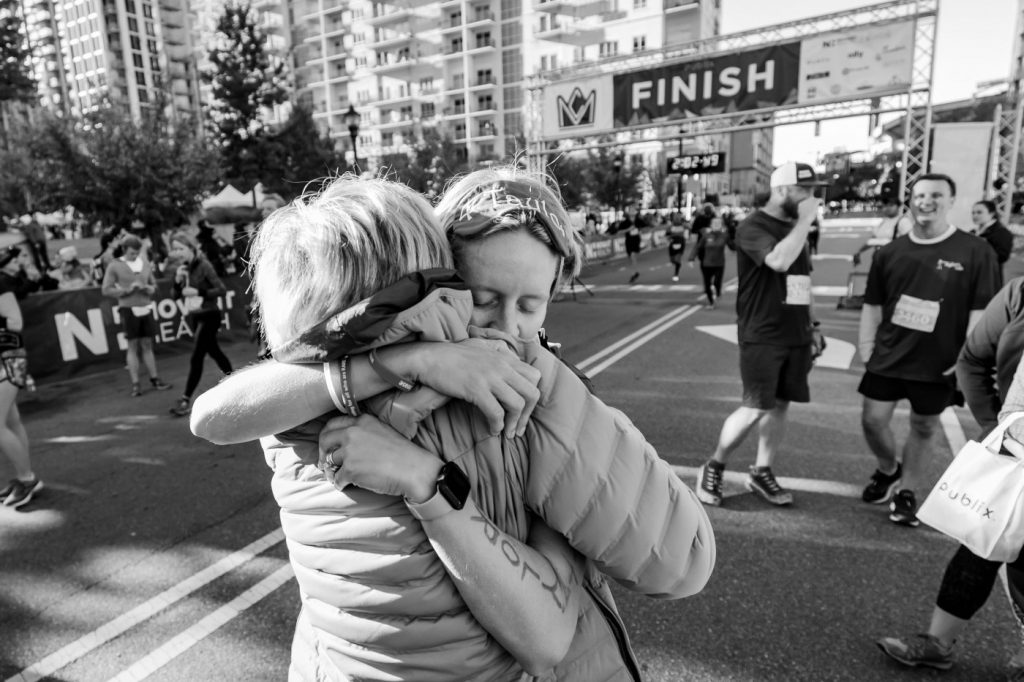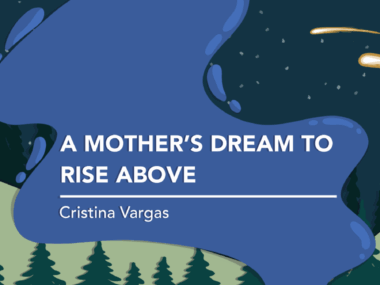Taylor’s Tale Co-founder Races to ‘Change the World’ for Batten Disease Community
Written by |

Laura King Edwards running the Charlotte Half Marathon in 2018. (Photo by Dan Salvo)
Laura King Edwards ran a half-marathon as a fifth anniversary nod to her sister’s first race — a 5K school run in 2008 that would be but a happy memory had Taylor King not been diagnosed with Batten disease (CLN1) some two years earlier, and already blind.
Fittingly, Edwards — who started running for her sister in 2009 — finished that race blindfolded, “4 Taylor” stitched across the cloth covering her eyes.
She would do it again in November 2018, but now as a new mother, a newly published author, and a sister honoring Taylor’s life and all that it brought to her family and the Batten community.
Taylor King, 20, died of her disease on Sept. 26, 2018, just days after Edwards gave birth to a boy at the same hospital.
But before this neurological disorder claimed her ability to speak, walk, or engage with friends and family, Taylor learned to read in Braille, joined schoolmates for a “dance routine” talent show, and took part in two 5K races as a 9- and 10-year-old.
“She … wanted to be a normal kid, and she did that as much as she was able,” Edwards said in an interview with Batten Disease News from her South Carolina home.
The girl also took part in an early stem cell clinical trial that included brain surgery shortly before her first school run — a grab for a lifeline at a time when “there wasn’t a lot going on for Taylor’s form of Batten disease,” she added.
Her sister accompanied Taylor for a second 5K race the next year, but was a spectator at the first.
“I watched her cross that finish line holding her head high. She was so proud and so courageous,” Edwards said.
“I’ve been running for her ever since. … Watching her do that gave me the courage to face Batten disease, not as a patient but as an older sister and as an advocate.”
Edwards, a columnist with Bionews Services, the parent company of this site, is a co-founder of Taylor’s Tale, a nonprofit supporting Batten research and rare disease advocacy.
Later this month, she will join her mother and fellow Taylor’s Tale co-founder, Sharon King, at the RARE Patient Advocacy Summit hosted by Global Genes in San Diego. There, the two will talk about how patients, families, and advocates can influence and advance work into treatments for rare diseases.
Their focus is on sharing “lessons learned and ways to make a difference,” Edwards said. “With a rare disease like Batten, if the advocates and families aren’t fighting, nobody will.”
Joining them onstage will be Steven Gray, an associate professor at the University of Texas Southwestern Medical Center with a research specialty in gene therapy. Taylor’s Tale and other foundations strongly supported Gray’s early work into Batten, also known as CLN disease, while he was at the University of North Carolina. The potential treatment, now known as ABO-202, was acquired by Abeona Therapeutics and won FDA approval for clinical testing in May.
If an idea “is promising,” Edwards said, groups like Taylor’s Tale need to keep it moving until “somebody with bigger pockets … can come in and pick it up and take it to the next level.”
A nonprofit run and overseen by volunteers, Taylor’s Tale started in 2007 with a goal of funding studies into a treatment that might save Taylor’s life.
“Initially, research was our sole focus,” Edwards said. “We had a singular goal of finding a cure for Batten disease.”
Research support continues to be a primary focus. The group’s largest investments to date have gone to advance work into a Batten enzyme replacement therapy first developed by researchers at UT Southwestern, and now being refined by Collaborations Pharmaceuticals.
But advocating for greater awareness and understanding of the nature of rare diseases like Batten, and how devastating they are to all those they touch, is now also at the fore.
Batten, like any chronic and devastating disease, “affects the whole family,” said Edwards, 37, a mutation carrier like her brother, Stephen King, 32. “It affects relationships within a family, it affects careers, finances; it’s really all-encompassing.”
A genetic test showed her husband, John, not to be a carrier, and their son, Jack, is healthy. She plans to recommend the boy undergo testing as well, when he’s ready.
Edwards provides a passing example in a June column of where advocacy — greater public understanding of what’s “realistic” with rare diseases — would help, at least in terms of public services.
Taylor was getting support for equine and pool therapy under a supplementary federal program early in her disease, only to lose it because she wasn’t getting better, as required.
That expectation “isn’t really realistic for patients like Taylor, children with Batten,” Edwards said. “We weren’t going to see improvement, because it’s a neurodegenerative disease. What we were trying to do was maintain functions, and the system just didn’t get that.”
The group’s turn to advocacy was also somewhat inevitable, born of Taylor’s refusal to just give in and give up.
That’s also the lesson at the heart of Edward’s 2018 memoir, “Run to the Light,” which she decided to write while flying to Oregon in 2014, the first leg of a racing journey she hopes will take her to all 50 U.S. states.
Edwards finished her 2013 marathon in less than two hours, and remembers taking off the blindfold and feeling “that I had a new understanding of really what it means to believe.”
That is, belief in a cause is greater than any one individual, because causes live on and move on to touch others.
“At that point, I knew we weren’t going to achieve our goals in time to save Taylor’s life,” Edwards said. “But I realized that you can still believe … even if it doesn’t mean what you thought it would.
“Even if we couldn’t save Taylor’s life, we still had a lot to fight for,” and a duty “to be positive and to find the good in every day, and to do everything we can to change the world for future Taylors,” she added.
“That’s a lesson that really took awhile to learn, and Taylor is responsible for teaching me that.”








